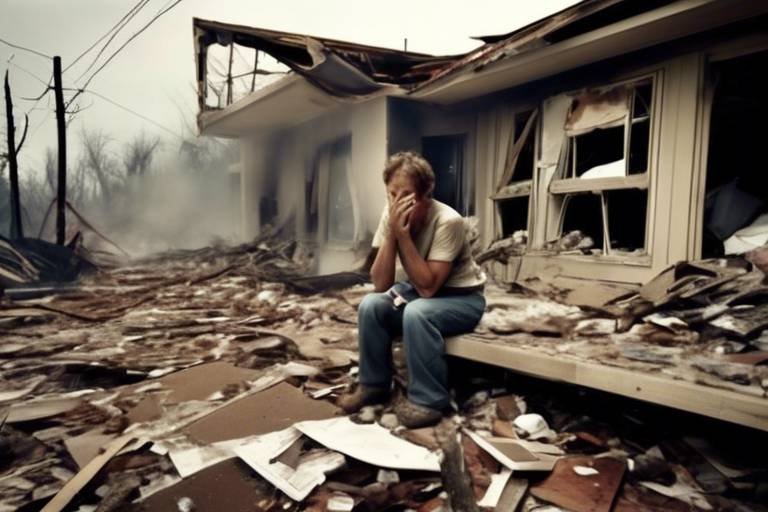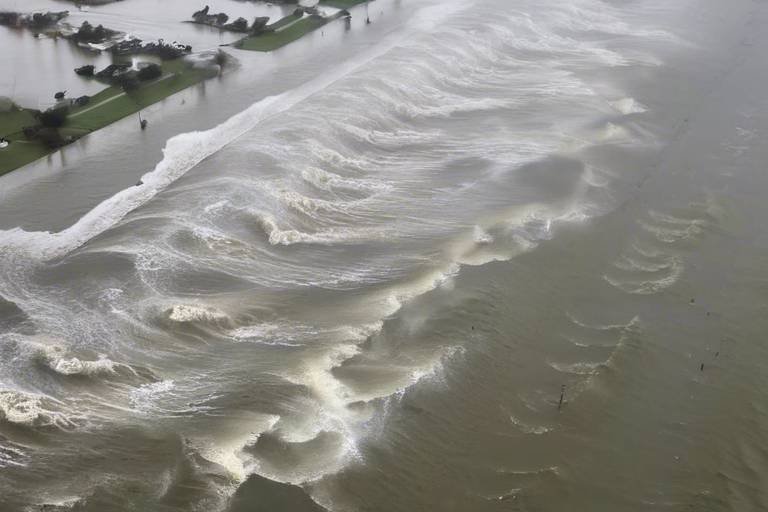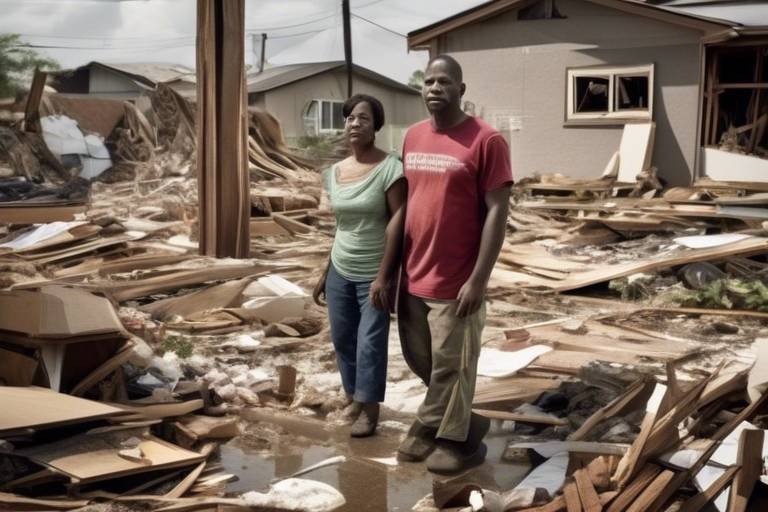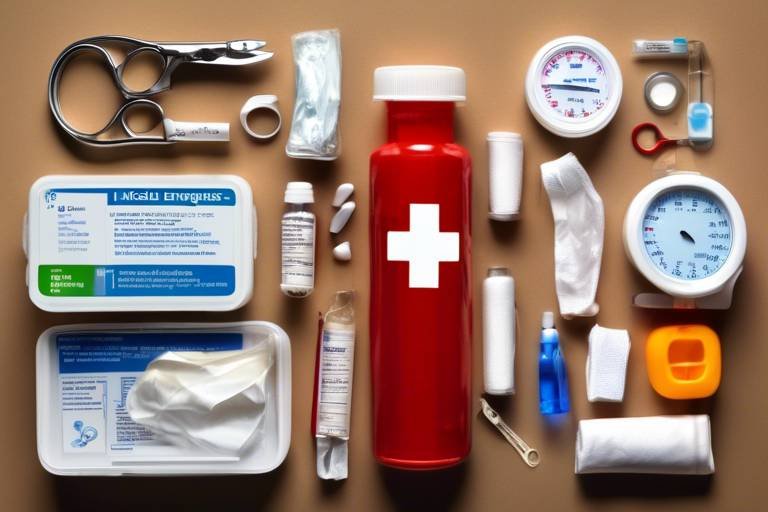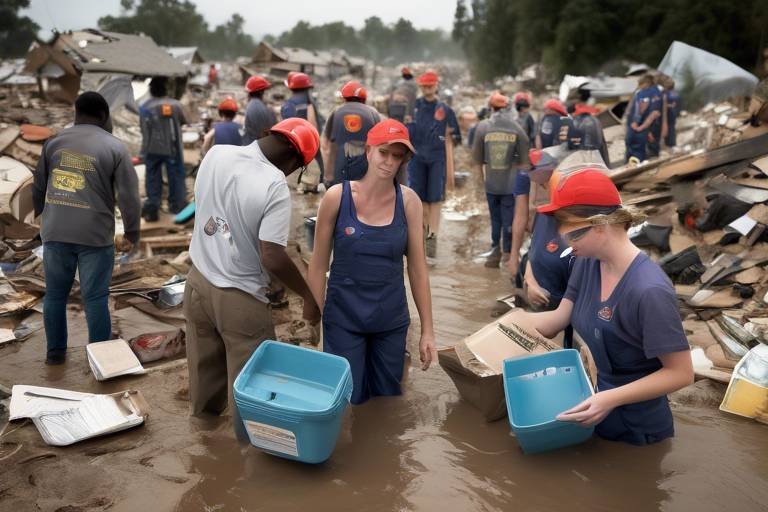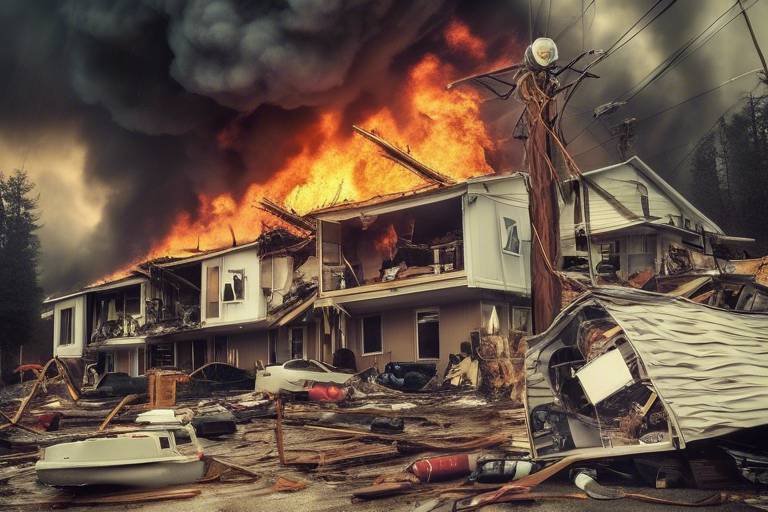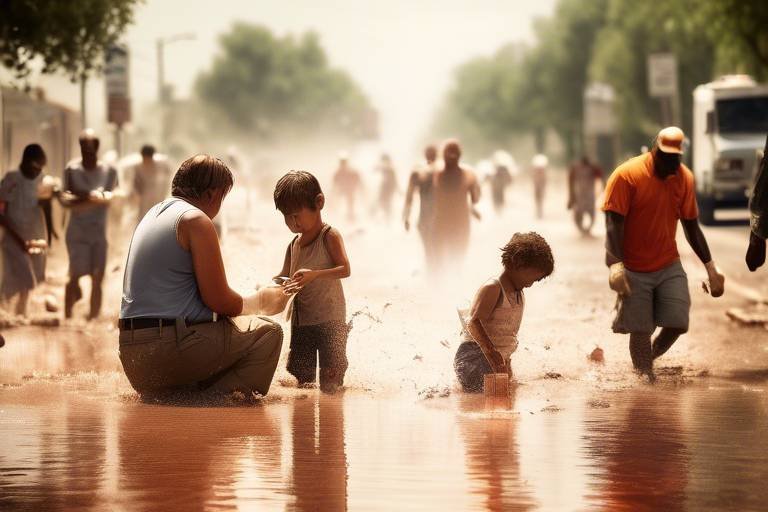The Psychological Challenges of Surviving a Disaster
Surviving a disaster is not just about physical endurance; it’s also about navigating a complex landscape of emotions and mental health challenges. The aftermath of a disaster can feel like a chaotic storm, leaving survivors grappling with feelings of confusion, fear, and uncertainty. It's essential to understand that these feelings are not just temporary; they can profoundly impact a person's mental health for years to come. When the dust settles, the psychological scars often remain, affecting how individuals relate to the world around them.
One of the most significant challenges faced by survivors is the risk of developing Post-Traumatic Stress Disorder (PTSD). This condition can manifest in various ways, including flashbacks, nightmares, and severe anxiety. Survivors may find themselves reliving the traumatic event, making it difficult to move forward. Recognizing PTSD is crucial because it allows for timely intervention and support, helping individuals reclaim their lives.
Moreover, anxiety often escalates following a disaster. Imagine waking up every day with a sense of dread, as if a shadow looms over your existence. This heightened state of anxiety can lead to a cycle of panic and distress, making recovery feel like an uphill battle. Survivors may experience physical symptoms, such as a racing heart or shortness of breath, which can be alarming and disorienting. Understanding the nature of anxiety and its triggers is vital for survivors to develop effective coping strategies.
Fortunately, there are numerous coping mechanisms available to help manage anxiety. These techniques can serve as lifelines, providing survivors with tools to navigate their emotional turmoil. For instance, practices like mindfulness and breathing exercises can significantly reduce anxiety levels. Imagine sitting quietly, focusing on your breath, and allowing your thoughts to drift away like leaves on a stream. This simple yet powerful practice can create a sense of calm amidst the chaos.
Furthermore, seeking social support is paramount during recovery. Connecting with others who have experienced similar challenges can foster a sense of belonging and understanding. Whether it's through support groups or simply talking with friends and family, sharing experiences can lighten the emotional load. Remember, you are not alone in this journey, and there are people who want to help you navigate the storm.
For many survivors, professional help and therapy options can provide essential support. Therapists and counselors are trained to guide individuals through their psychological challenges, offering a safe space to process emotions and develop coping strategies. Therapy can range from cognitive-behavioral approaches to more holistic methods, ensuring that each survivor receives personalized care tailored to their unique needs.
Disasters also take a toll on families and relationships. The stress and emotional strain can lead to misunderstandings and conflicts, making it essential to address the psychological challenges collectively. Open communication is crucial; discussing feelings and experiences can strengthen bonds and create a supportive environment. After all, navigating recovery is often easier when you have a solid support system by your side.
Children, in particular, may react differently to disasters than adults. Their understanding of trauma is often limited, making it vital for caregivers to provide reassurance and emotional support. Children may exhibit behavioral changes, such as withdrawal or increased clinginess, which can be alarming for parents. Understanding these unique psychological challenges and responding with empathy is essential for helping children process their experiences.
Finally, it's important to recognize that the psychological impact of disasters can persist long after the event. Survivors may face ongoing challenges, such as anxiety or depression, that require continuous support. Long-term mental health care is crucial for helping individuals rebuild their lives and find a sense of normalcy again. The journey to recovery may be long, but with the right resources and support, it is entirely possible to emerge stronger on the other side.
- What are the common symptoms of PTSD? Symptoms include flashbacks, nightmares, severe anxiety, and uncontrollable thoughts about the event.
- How can I help a loved one who is struggling after a disaster? Encourage them to talk about their feelings, listen without judgment, and suggest professional help if needed.
- Are there specific therapies that work best for disaster survivors? Cognitive-behavioral therapy (CBT) and Eye Movement Desensitization and Reprocessing (EMDR) are effective for many survivors.
- How can mindfulness help with anxiety? Mindfulness practices help individuals focus on the present moment, reducing anxiety by promoting relaxation and awareness.
- What role does social support play in recovery? Social support provides emotional relief, a sense of belonging, and practical assistance, all of which are crucial for recovery.

Understanding Post-Traumatic Stress Disorder (PTSD)
This article explores the mental health impacts of surviving disasters, including trauma, anxiety, and coping mechanisms. Understanding these challenges is crucial for recovery and support for affected individuals.
Post-Traumatic Stress Disorder, commonly known as PTSD, is a significant psychological condition that can develop after an individual experiences or witnesses a traumatic event. This disorder is not just a fleeting emotional response; it can profoundly affect a person's day-to-day life, leading to persistent symptoms that may interfere with their ability to function normally. Imagine living in a world where your mind is constantly replaying the traumatic event, much like a broken record that just won’t stop. This is the reality for many survivors.
PTSD manifests through a variety of symptoms, which can be categorized into four main groups:
- Intrusive Memories: Survivors may experience flashbacks, nightmares, or severe anxiety when reminded of the trauma.
- Avoidance: Individuals often avoid places, people, or activities that remind them of the traumatic event, leading to isolation.
- Negative Changes in Thinking and Mood: This can include feelings of hopelessness, emotional numbness, or difficulty experiencing positive emotions.
- Changes in Physical and Emotional Reactions: Survivors may exhibit heightened reactions, such as being easily startled or feeling tense, which can lead to irritability and outbursts.
According to research, PTSD affects approximately 7-8% of the population at some point in their lives. However, this number can be significantly higher among disaster survivors, particularly those who have experienced severe trauma. Recognizing and addressing PTSD is crucial for recovery, as untreated symptoms can lead to further complications, including depression and substance abuse.
One of the most challenging aspects of PTSD is the stigma surrounding mental health. Many survivors may feel ashamed or embarrassed to seek help, fearing judgment from others. It's essential to foster an environment where individuals feel safe to express their feelings and seek the support they need. Early intervention can make a world of difference, and understanding the signs of PTSD is the first step toward healing.
In conclusion, PTSD is a complex condition that requires empathy and understanding. By acknowledging its prevalence and symptoms, we can better support those affected and encourage them to seek the help they deserve. Remember, recovery is not just about overcoming the trauma; it's about rebuilding a life that feels safe and fulfilling.
Anxiety often escalates following a disaster. Here, we examine how anxiety manifests in survivors and the strategies to manage it effectively during the recovery process.
Survivors can utilize various coping mechanisms to alleviate anxiety. This subsection discusses practical techniques such as mindfulness, breathing exercises, and seeking social support.
Mindfulness practices can significantly reduce anxiety levels. This segment outlines specific techniques that survivors can incorporate into their daily routines for better mental health.
Social support is vital for recovery. This part highlights how connecting with others can provide emotional relief and a sense of belonging during challenging times.
Professional mental health support is crucial for many survivors. This section reviews various therapy options available to help individuals navigate their psychological challenges post-disaster.
Disasters can strain family dynamics and relationships. This section explores how psychological challenges affect interpersonal connections and offers strategies for maintaining healthy relationships.
Effective communication is essential during recovery. Here, we discuss how open dialogue can strengthen relationships and provide emotional support for survivors.
Children may react differently to disasters than adults. This subsection focuses on understanding children's unique psychological challenges and how to support their emotional needs during recovery.
The psychological impact of disasters can persist long after the event. This section examines the long-term effects survivors may face and the importance of ongoing mental health support.
Q: What are the common signs of PTSD?
A: Common signs include intrusive memories, avoidance of reminders, negative thoughts, and heightened emotional reactions.
Q: How can I support someone with PTSD?
A: Listen without judgment, encourage professional help, and be patient as they navigate their feelings.
Q: Is it normal to feel anxious after a disaster?
A: Yes, anxiety is a common response, and it's important to address it through coping strategies or professional help.
Q: Where can I find help for PTSD?
A: Many resources are available, including therapists, support groups, and hotlines dedicated to mental health support.
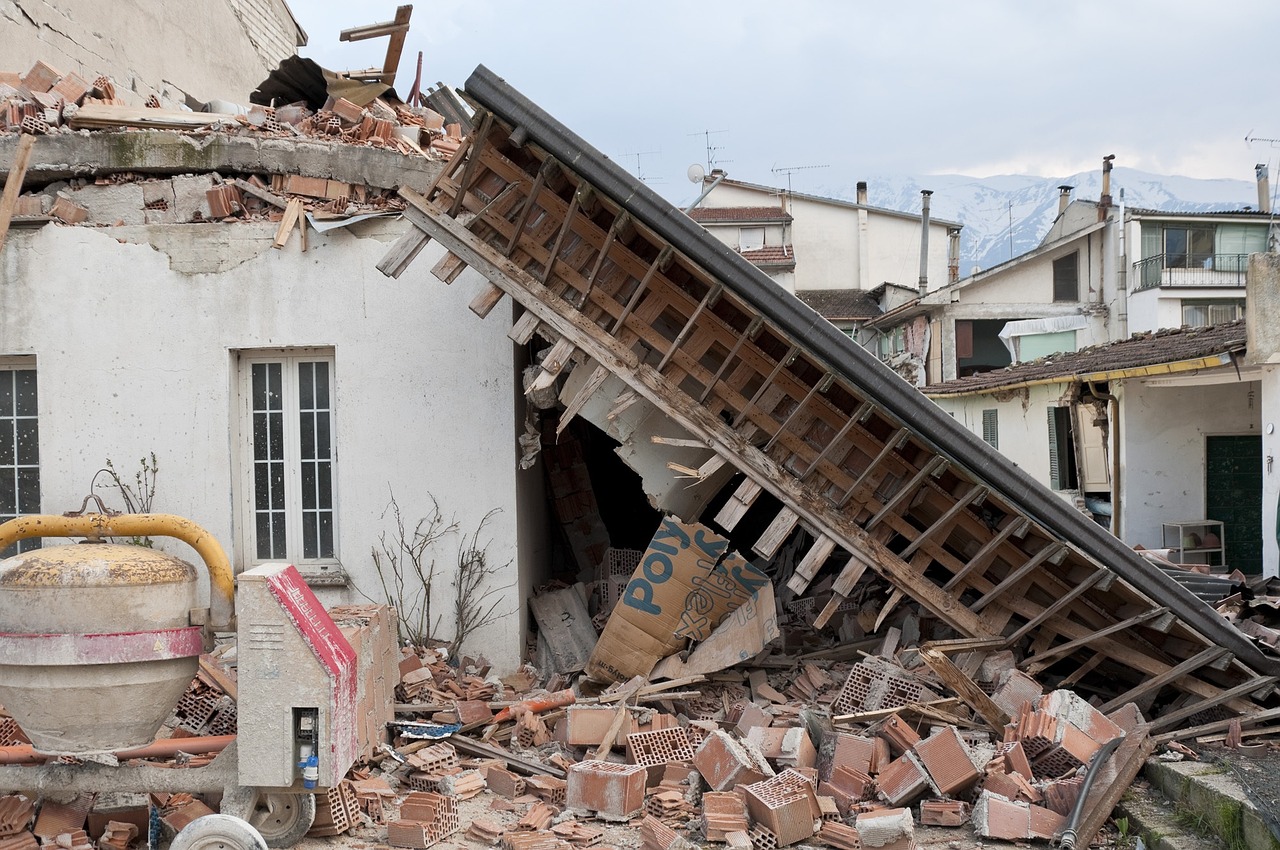
The Role of Anxiety in Disaster Recovery
Anxiety is a natural response to the chaos and uncertainty that follows a disaster. It can feel like a heavy cloud hanging over survivors, making even the simplest tasks seem daunting. After experiencing a traumatic event, individuals often find themselves grappling with a whirlwind of emotions, and anxiety can escalate significantly during this time. It’s like trying to navigate through a dense fog where every step feels uncertain and fraught with danger. Understanding how anxiety manifests in survivors is crucial for effective recovery.
In the aftermath of a disaster, survivors may experience heightened levels of anxiety due to various factors, including the fear of recurring events, concerns about personal safety, and the stress of rebuilding their lives. This anxiety can present itself in multiple ways, such as constant worry, restlessness, or even physical symptoms like increased heart rate and difficulty sleeping. It’s essential to recognize that these reactions are not merely signs of weakness; they are normal responses to abnormal situations.
Moreover, the impact of anxiety can ripple through various aspects of a survivor's life. For example, it can affect their ability to make decisions, maintain relationships, and engage in daily activities. When anxiety takes the driver's seat, it can lead to avoidance behaviors where individuals may shy away from situations that remind them of the disaster. This avoidance, while a coping mechanism, can ultimately hinder recovery and prolong the healing process.
To manage anxiety effectively during recovery, survivors can adopt several strategies. These strategies can be as simple as establishing a routine, which provides a sense of normalcy amidst the chaos. Engaging in physical activity, such as walking or yoga, can also serve as a powerful antidote to anxiety. Additionally, practicing mindfulness techniques can help individuals remain grounded in the present moment, reducing the tendency to ruminate on past events or worry about the future.
Here are some practical techniques that can be beneficial for managing anxiety:
- Deep Breathing Exercises: Taking slow, deep breaths can help calm the nervous system and reduce feelings of anxiety.
- Mindfulness Meditation: Engaging in mindfulness practices can help individuals focus on the present, alleviating anxious thoughts about the past or future.
- Journaling: Writing about feelings and experiences can provide a safe outlet for emotions and help clarify thoughts.
- Social Engagement: Connecting with friends and family can provide emotional support and reduce feelings of isolation.
It’s important to remember that while anxiety can be overwhelming, it is manageable. Seeking professional help can be a game-changer for many survivors. Therapists and counselors can offer tailored strategies and support to help individuals navigate their anxiety and work towards recovery. Therapy options, such as cognitive-behavioral therapy (CBT), can empower individuals to challenge their anxious thoughts and develop healthier coping mechanisms.
In summary, anxiety plays a significant role in disaster recovery. By understanding its effects and implementing effective coping strategies, survivors can reclaim their lives and move forward with resilience. It’s a journey, and like any journey, it’s essential to take one step at a time, allowing for healing and growth along the way.
Q: How long does anxiety last after a disaster?
A: The duration of anxiety can vary from person to person. For some, it may subside within weeks, while others may experience it for months or even years. Seeking support can help alleviate symptoms sooner.
Q: What are some signs that anxiety is becoming problematic?
A: Signs include persistent worry, avoidance of certain situations, difficulty concentrating, and physical symptoms like headaches or stomachaches. If these symptoms interfere with daily life, it may be time to seek professional help.
Q: Can children experience anxiety after a disaster?
A: Yes, children can experience anxiety differently than adults. They may express their feelings through behavioral changes or regression in skills. It’s important to provide them with support and reassurance during recovery.

Coping Mechanisms for Anxiety
When disaster strikes, the aftermath can leave many of us feeling like we're walking on a tightrope, balancing our emotions and mental health. Anxiety can become a constant companion, whispering doubts and fears into our minds. But fear not! There are effective coping mechanisms that can help us regain our footing and navigate through the storm of anxiety.
One of the most powerful tools at our disposal is mindfulness. This practice encourages us to anchor ourselves in the present moment, allowing us to step back from the chaos swirling in our minds. By focusing on our breath or the sensations in our bodies, we can create a sense of calm amidst the turmoil. Imagine being in the eye of a hurricane—while everything around you is chaotic, you find a peaceful center.
Another effective method is breathing exercises. Simple techniques like the 4-7-8 method can work wonders. Here’s how it goes:
1. Inhale deeply through your nose for 4 seconds. 2. Hold your breath for 7 seconds. 3. Exhale slowly through your mouth for 8 seconds.
Repeating this cycle a few times can help slow your heart rate and reduce anxiety levels significantly. It's like giving your nervous system a gentle hug!
Additionally, seeking social support is crucial during these trying times. Connecting with friends, family, or support groups can provide emotional relief and a sense of belonging that is often lost in the aftermath of a disaster. Sharing your feelings with someone who understands can lighten the emotional load. Think of it as a lifeline thrown to you in turbulent waters.
Incorporating these coping mechanisms into your daily routine can create a robust toolkit for managing anxiety. Remember, it's not about eliminating anxiety altogether but learning to ride the waves when they come. With practice, you can transform anxiety from a daunting adversary into a manageable companion.
- What is mindfulness? Mindfulness is the practice of being fully present and engaged in the moment, without judgment. It helps in reducing anxiety by focusing your mind away from distressing thoughts.
- How often should I practice breathing exercises? It's beneficial to practice breathing exercises daily, especially during moments of heightened anxiety. Just a few minutes can make a significant difference.
- Why is social support important? Social support provides emotional comfort, practical assistance, and a sense of belonging, which are crucial for recovery from anxiety and trauma.

Mindfulness and Relaxation Techniques
In the aftermath of a disaster, the chaos and confusion can leave survivors feeling overwhelmed and anxious. This is where mindfulness and relaxation techniques come into play, acting as a lifeline for those navigating the turbulent waters of their emotions. Mindfulness is all about being present in the moment, allowing individuals to step back from their racing thoughts and observe their feelings without judgment. Imagine standing on the shore, watching the waves crash against the rocks; that’s what mindfulness can feel like—an opportunity to witness your thoughts and emotions without getting swept away by them.
One effective method of practicing mindfulness is through meditation. Just a few minutes a day can make a significant difference. Try sitting comfortably, closing your eyes, and focusing on your breath. Inhale deeply, hold for a moment, and exhale slowly. This simple act can help clear your mind and reduce feelings of anxiety. To enhance this experience, consider using guided meditation apps or videos, which can provide structure and support as you begin your journey.
Another powerful technique is progressive muscle relaxation. This involves tensing and then relaxing different muscle groups in your body, promoting a sense of physical and mental release. Start with your toes, tense them for a few seconds, then relax. Gradually move up your body, through your legs, abdomen, arms, and face. This method not only helps in reducing tension but also fosters a deeper connection between your mind and body.
Additionally, incorporating breathing exercises into your daily routine can be incredibly beneficial. For instance, the 4-7-8 technique involves inhaling for four seconds, holding your breath for seven seconds, and exhaling for eight seconds. This rhythmic breathing pattern can help calm your nervous system and reduce anxiety levels. It’s a simple yet effective tool that can be practiced anywhere, whether you’re at home or in a crowded place.
Lastly, don't underestimate the power of nature. Spending time outdoors can significantly enhance your mental well-being. Nature has a way of grounding us, reminding us of the beauty that still exists in the world. Whether it’s taking a walk in the park, listening to the rustling leaves, or simply sitting by a river, connecting with nature can be a profound way to practice mindfulness and relaxation.
Incorporating these mindfulness and relaxation techniques into your daily life doesn’t have to be daunting. Start small, be patient with yourself, and gradually build a routine that feels comfortable. Remember, the goal is not to eliminate anxiety entirely but to learn how to navigate through it with greater ease and resilience. These practices can serve as your anchor, helping you to stay grounded amidst the storm of emotions that often accompany the aftermath of a disaster.
- What is mindfulness?
Mindfulness is the practice of being fully present and engaged in the moment, allowing individuals to observe their thoughts and feelings without judgment.
- How can mindfulness help with anxiety?
Mindfulness helps by promoting awareness and acceptance of thoughts, which can reduce the power they have over our emotions and reactions.
- What are some easy mindfulness practices I can start with?
Simple practices include meditation, deep breathing exercises, and spending time in nature.
- How long should I practice mindfulness each day?
Even just 5-10 minutes a day can be beneficial, but gradually increasing the time can enhance the effects.
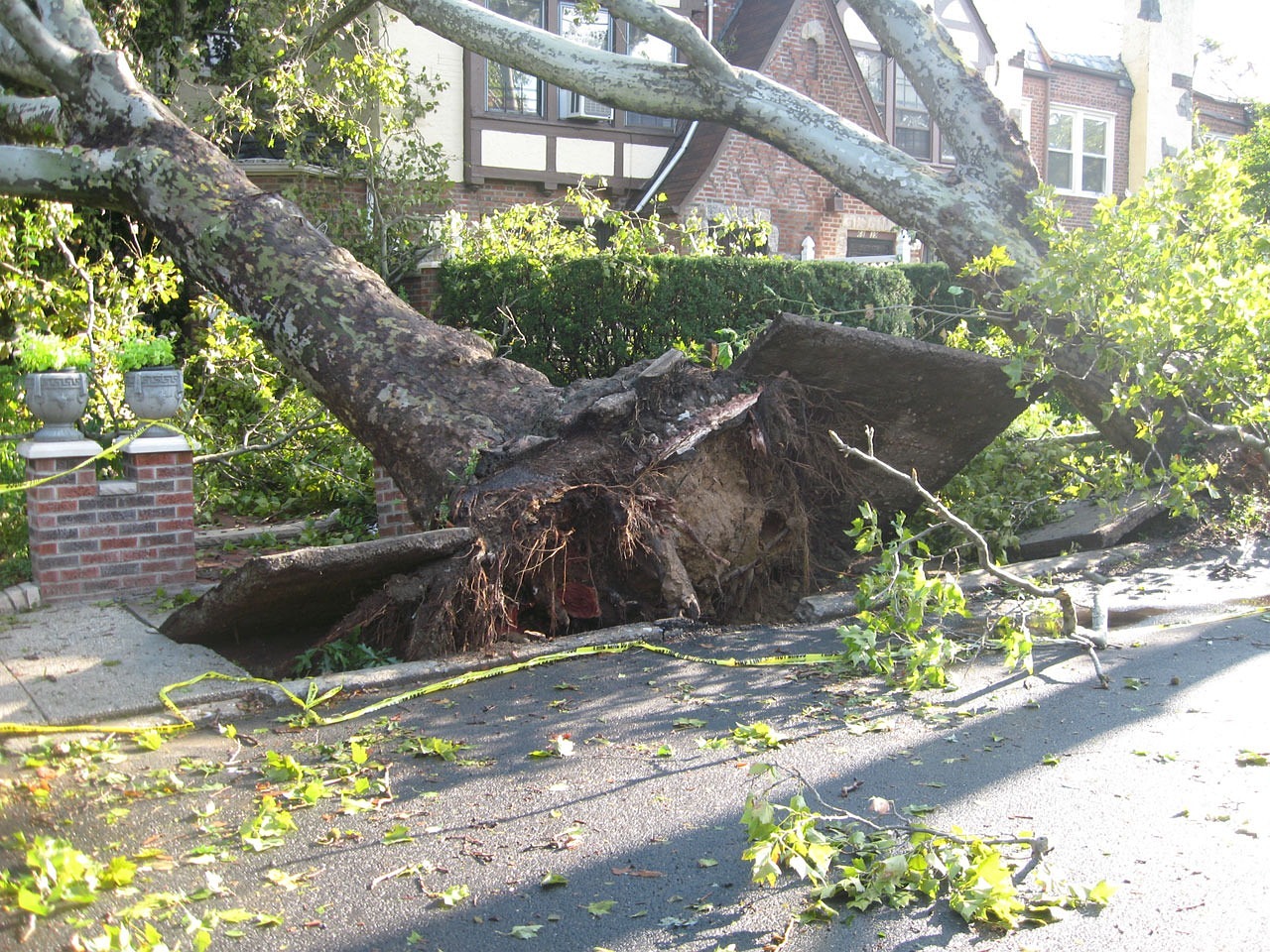
Importance of Social Support
When disaster strikes, it can feel like the ground has been ripped from beneath our feet. The emotional aftermath can be overwhelming, but one of the most powerful antidotes to this turmoil is social support. Imagine yourself in a stormy sea, tossed about by waves of anxiety and despair. Now, picture a lifebuoy thrown your way by friends, family, or even community members. That lifebuoy is social support, and it can make all the difference in a survivor's recovery journey.
Social support encompasses the emotional, informational, and practical assistance we receive from those around us. It’s not just about having someone to talk to; it’s about creating a network of care that helps individuals navigate the choppy waters of post-disaster life. Studies have shown that people with strong social connections tend to experience less stress and recover more quickly from traumatic events. This is because social support can:
- Provide Emotional Relief: Sharing experiences and feelings with someone who understands can lighten the emotional burden.
- Enhance Coping Strategies: Friends and family can offer new perspectives and coping mechanisms that individuals may not have considered.
- Foster a Sense of Belonging: Being part of a community can help survivors feel less isolated and more connected.
In the aftermath of a disaster, many individuals may withdraw or isolate themselves, thinking that they can handle their struggles alone. However, this isolation can exacerbate feelings of anxiety and depression. By reaching out to others, survivors can find solace in shared experiences. It’s important to remember that vulnerability is not a weakness; rather, it is a vital step toward healing.
Moreover, the importance of social support extends beyond immediate family and friends. Community organizations, support groups, and online forums can also play a crucial role. These platforms allow survivors to connect with others who have faced similar challenges, providing a sense of understanding and camaraderie. For instance, participating in a local support group can help individuals gain insights and strategies from others who are navigating the same difficult path.
Ultimately, the journey of recovery is not one that needs to be taken alone. By embracing social support, survivors can build a robust network that offers strength, understanding, and encouragement. So, the next time you find yourself in a tough spot, remember that reaching out to others can be the first step toward reclaiming your sense of self and well-being.
- Why is social support important after a disaster? Social support helps individuals process their emotions, reduces feelings of isolation, and encourages recovery through shared experiences.
- How can I find social support after a disaster? You can reach out to friends and family, join local support groups, or participate in community events focused on recovery.
- What if I don’t feel comfortable talking about my experiences? It’s okay to take your time. You can start by engaging in activities with others or seeking professional help if needed.

Professional Help and Therapy Options
When it comes to navigating the psychological aftermath of a disaster, seeking professional help can be a game changer. Many survivors find themselves overwhelmed by their emotions, and that's completely normal. It’s like being caught in a storm where the winds of anxiety and fear are relentless. But just as you would seek shelter from a raging tempest, finding a qualified mental health professional can provide a safe haven for your thoughts and feelings.
There are several therapy options available, each tailored to meet the unique needs of individuals. For example, Cognitive Behavioral Therapy (CBT) is particularly effective for those dealing with anxiety and PTSD. CBT helps survivors reframe negative thoughts and develop healthier coping strategies. It’s akin to having a personal coach who guides you through the mental hurdles, helping you emerge stronger and more resilient.
Another valuable approach is Exposure Therapy, which involves gradual exposure to the memories or triggers associated with the traumatic event. This method can help desensitize individuals to their fears, allowing them to regain control over their lives. Think of it as slowly dipping your toes into a cold pool until you’re ready to dive in fully.
In addition to these therapies, support groups can also play a crucial role in recovery. These groups provide a platform for individuals to share their experiences and feelings, fostering a sense of community and understanding. It's comforting to know that you are not alone in your struggles. Many find that the shared experiences within these groups can be incredibly healing.
To give you a clearer picture of the different therapy options, here’s a quick comparison:
| Therapy Type | Description | Best For |
|---|---|---|
| Cognitive Behavioral Therapy (CBT) | Focuses on changing negative thought patterns. | Anxiety, PTSD |
| Exposure Therapy | Gradual exposure to trauma-related triggers. | PTSD, Phobias |
| Support Groups | Group sessions for sharing experiences. | Emotional support, Community |
| Medication | Prescription drugs to manage symptoms. | Anxiety, Depression |
While therapy is essential, it’s equally important to explore medication options if symptoms are particularly severe. Antidepressants and anti-anxiety medications can help manage the emotional rollercoaster many survivors experience. However, it's crucial to consult with a healthcare provider to find the right medication and dosage tailored to individual needs.
In summary, the journey to recovery from a disaster is rarely straightforward, but professional help can make a significant difference. Whether through therapy, support groups, or medication, there are numerous avenues available to help survivors reclaim their lives. It's like having a toolbox filled with various tools—each one can help you build a stronger foundation for your mental health.
- What is the first step in seeking professional help? The first step is often acknowledging that you need support and reaching out to a mental health professional.
- How do I know if I need therapy? If you find that your daily life is significantly impacted by feelings of anxiety, depression, or trauma, it may be time to consider therapy.
- Can therapy really help after a disaster? Yes! Many survivors find therapy to be a vital part of their recovery process, helping them to process their experiences and develop coping strategies.
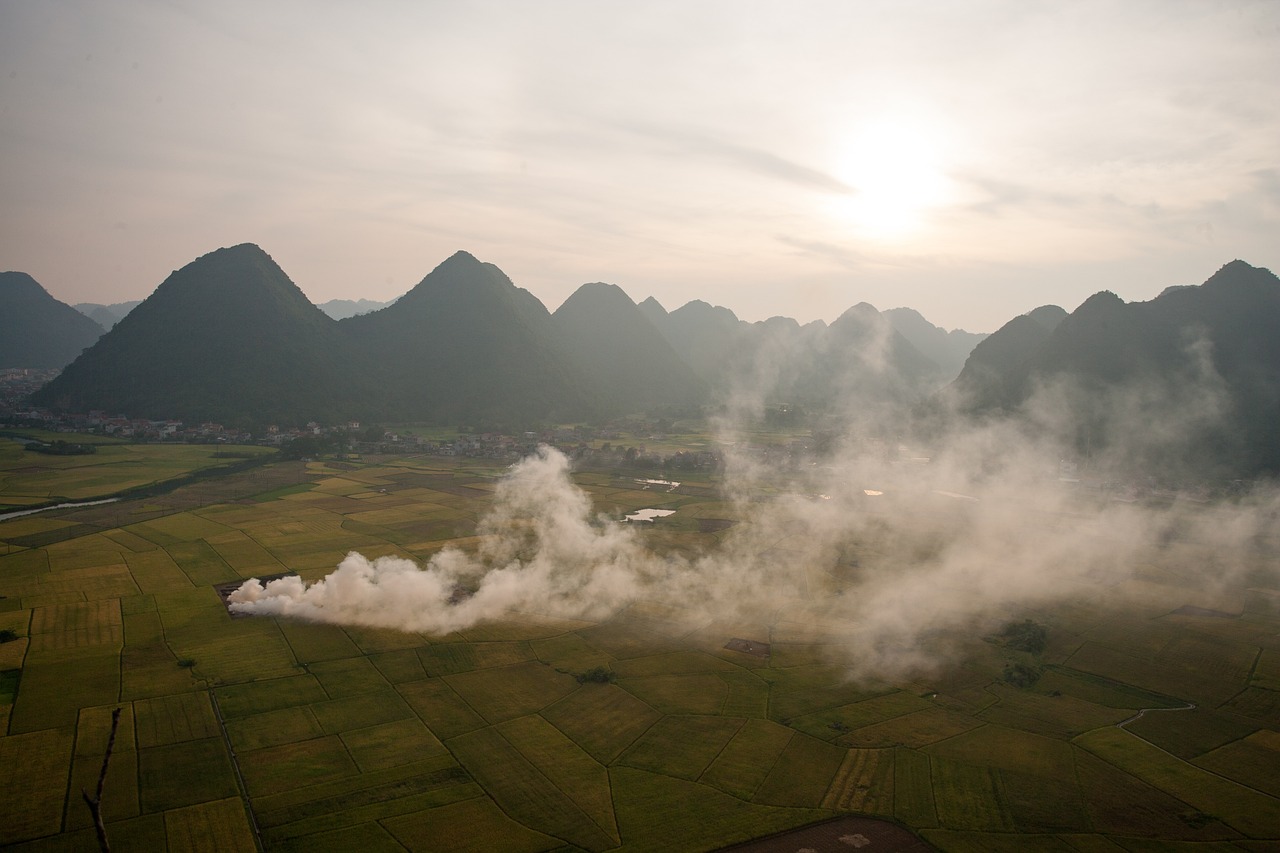
Impact on Families and Relationships
Disasters don't just affect individuals; they ripple through families and relationships, creating a complex web of emotional turmoil. When a disaster strikes, it's like throwing a rock into a still pond—the effects spread far and wide. Families often find themselves navigating a new reality filled with stress, uncertainty, and emotional challenges. The psychological impact can strain relationships, causing misunderstandings and conflicts that may not have existed before. It’s essential to recognize that each family member may respond differently to the trauma, leading to a variety of emotional responses.
For instance, one family member might become withdrawn, while another may exhibit anger or frustration. This disparity can create a communication gap, making it harder for families to support one another. It’s crucial to foster an environment where all feelings are valid and can be expressed openly. By doing so, families can work together to rebuild their emotional connections, which may have been shaken by the disaster. Establishing a safe space for dialogue can help alleviate tensions and promote healing.
Moreover, the role of children in the family dynamic can significantly change after a disaster. They often look up to adults for guidance and reassurance. If parents are struggling with their own emotional challenges, it may be difficult for them to provide the support their children need. This can lead to children feeling isolated or confused about their own emotions. Understanding how to communicate effectively with children during such times is vital. Parents should encourage open conversations about feelings, fears, and hopes for the future, ensuring that children feel heard and supported.
To illustrate the impact of disasters on family relationships, consider the following table that outlines common emotional responses and their potential effects:
| Emotional Response | Potential Effect on Family Dynamics |
|---|---|
| Withdrawal | Increased feelings of isolation among family members. |
| Anger | Heightened conflict and misunderstandings. |
| Anxiety | Difficulty in making decisions and engaging in daily activities. |
| Depression | Loss of interest in family activities and bonding. |
Ultimately, the key to navigating these challenges lies in effective communication and mutual support. Families can engage in activities together that promote healing, such as sharing stories, participating in community support groups, or seeking professional help when needed. By prioritizing emotional well-being and understanding each other's experiences, families can emerge from disasters stronger and more united than before.
- How can families support each other after a disaster? Open communication, shared activities, and seeking professional help can strengthen family bonds.
- What should I do if my child is struggling emotionally after a disaster? Encourage them to express their feelings and consider professional counseling if needed.
- How can I communicate effectively with my partner during recovery? Practice active listening and validate each other's feelings to foster understanding.
- Are there community resources available for families affected by disasters? Yes, many local organizations offer support groups and counseling services for affected families.

Communicating with Loved Ones
After a disaster, communication with loved ones becomes a lifeline, a way to navigate the tumultuous waters of emotional recovery. It’s not just about talking; it’s about sharing feelings, fears, and hopes. When the world feels like it’s been turned upside down, having someone to confide in can make all the difference. But why is effective communication so crucial during these times?
First off, open dialogue can help in validating feelings. Survivors often experience a whirlwind of emotions, from anger to sadness, and sometimes even guilt. By expressing these feelings to someone who listens, individuals can find solace and reassurance that they are not alone in their struggles. It’s like finding an anchor in a stormy sea; it provides stability and comfort.
Moreover, discussing experiences can foster a sense of shared understanding. When loved ones share their stories, it creates a bond that can strengthen relationships. It’s important to remember that everyone processes trauma differently. Some may want to talk about their experiences in detail, while others might prefer to share less. Respecting these differences is key to effective communication.
Here are a few tips to enhance communication with loved ones during recovery:
- Listen actively: Sometimes, just being there and listening can mean the world. Show empathy and understanding.
- Be patient: Recovery is a journey, and it takes time. Allow your loved ones to express themselves at their own pace.
- Use “I” statements: Instead of saying “You make me feel…” try “I feel…” This approach reduces defensiveness and encourages open dialogue.
- Encourage expression: Let your loved ones know it’s okay to share their feelings, no matter how difficult they may be.
Additionally, incorporating non-verbal communication can also be helpful. Sometimes a warm hug or a simple touch can convey more than words ever could. It’s about creating a safe space where loved ones feel comfortable to express themselves without judgment.
In the aftermath of a disaster, it’s also beneficial to establish regular check-ins. Setting aside time each week to catch up can help maintain connections and provide ongoing support. This routine can be a beacon of hope, reminding everyone involved that healing is a process that doesn’t have to be faced alone.
Ultimately, effective communication is about building a bridge of trust and understanding. It’s a powerful tool that can help survivors navigate their emotional landscape and foster resilience. Remember, it’s okay to seek help if communication feels challenging. Sometimes, a professional can facilitate these conversations, making it easier for individuals to express their feelings.
| Question | Answer |
|---|---|
| How can I help a loved one who is struggling after a disaster? | Be there for them, listen actively, and encourage open dialogue. Sometimes just being present can provide immense support. |
| What if I don’t know what to say? | It’s okay to admit that you don’t have the right words. Just expressing that you care and are willing to listen can be enough. |
| Should I push my loved one to talk about their feelings? | No, it’s important to allow them to share at their own pace. Pushing can create more anxiety and resistance. |
| When should I seek professional help for my loved one? | If their emotional struggles persist or worsen, or if they express thoughts of self-harm, it’s crucial to encourage them to seek professional support. |
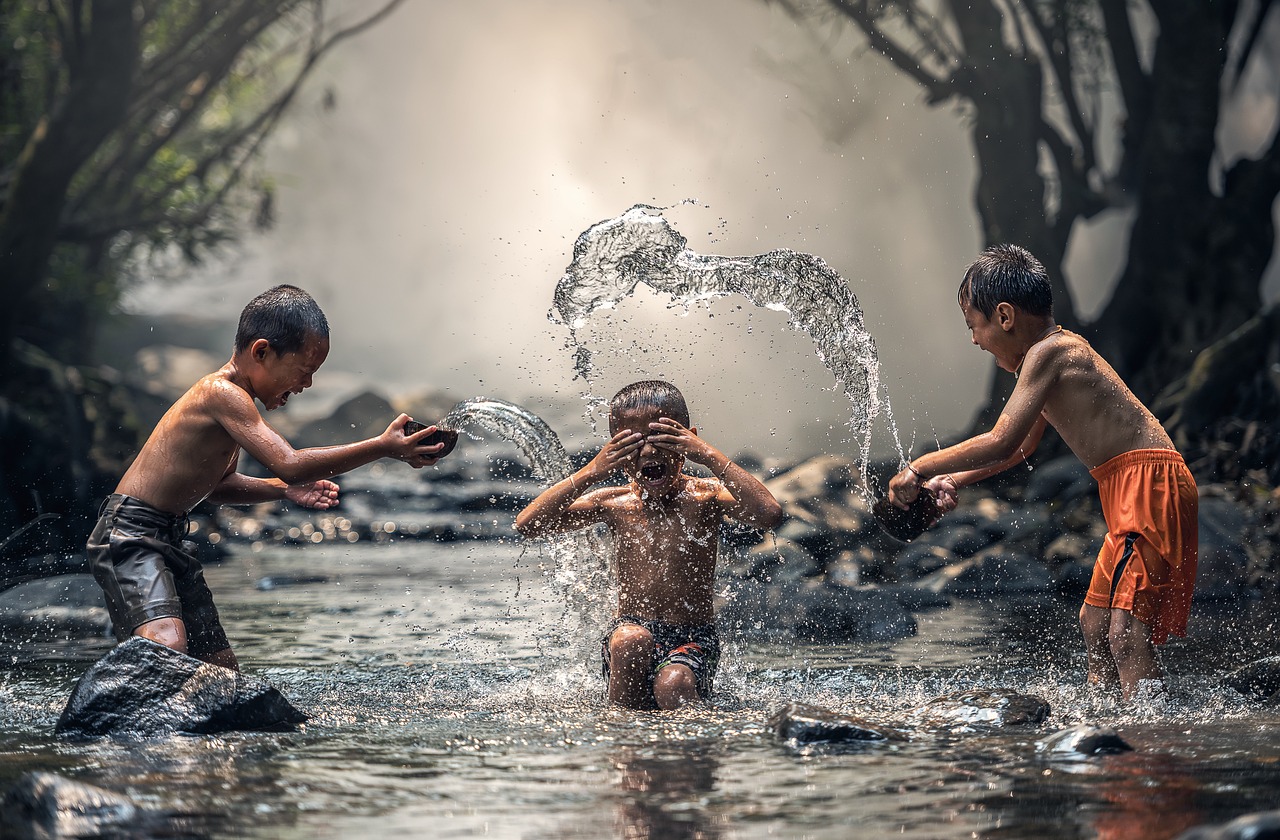
Children's Psychological Responses
When disasters strike, the impact on children can be profound and complex. Unlike adults who may have developed coping mechanisms over time, children often lack the tools to process their emotions effectively. Their reactions can vary widely based on age, personality, and previous experiences. For instance, younger children might revert to earlier behaviors, such as bedwetting or thumb-sucking, as a way to cope with stress. On the other hand, older children and teenagers may exhibit signs of anger, withdrawal, or even depression.
It's crucial to recognize that children's psychological responses can manifest in both emotional and physical symptoms. They might experience nightmares, changes in appetite, or difficulty concentrating in school. This can lead to a cycle where their academic performance suffers, further exacerbating their anxiety and feelings of isolation. For parents and caregivers, understanding these responses is the first step toward providing the necessary support.
One effective way to help children navigate their feelings is through open communication. Encouraging them to express their thoughts and emotions can alleviate some of the burden they may feel. Here are a few strategies that can be beneficial:
- Active Listening: Give them your full attention and validate their feelings.
- Creative Expression: Encourage drawing, writing, or playing to help them articulate their emotions.
- Routine and Stability: Maintain a consistent daily schedule to provide a sense of normalcy.
Additionally, it’s important to monitor their behavior closely. If a child shows persistent signs of distress or if their reactions interfere with their daily functioning, seeking professional help may be necessary. Mental health professionals can provide tailored strategies to help children cope with their feelings and build resilience in the face of adversity.
In conclusion, understanding children's psychological responses to disasters is essential for their recovery. By fostering an environment of support and open communication, caregivers can significantly aid in their healing process. Remember, it's not just about getting through the disaster; it's about helping children thrive in its aftermath.
Q: How can I tell if my child is struggling after a disaster?
A: Look for changes in behavior, such as increased clinginess, withdrawal from friends, changes in sleep patterns, or a drop in academic performance. If these behaviors persist, consider seeking professional help.
Q: What should I say to my child about the disaster?
A: Be honest but age-appropriate. Provide reassurance and let them know it’s okay to feel upset. Encourage them to ask questions and express their feelings.
Q: How can I help my child feel safe again?
A: Establishing a routine, providing comfort items, and engaging in activities they enjoy can help restore a sense of safety and normalcy.

Long-Term Psychological Effects
Surviving a disaster can leave a lasting imprint on an individual's mental health. The psychological scars often extend far beyond the immediate aftermath, affecting survivors in profound ways. Many people might think that once the chaos subsides, the emotional turmoil will also fade. However, the reality is that the long-term psychological effects can linger for years, sometimes even a lifetime. Survivors may grapple with feelings of anxiety, depression, and post-traumatic stress disorder (PTSD), which can significantly alter their daily lives and relationships.
One of the most concerning long-term effects is the development of chronic anxiety. After experiencing a traumatic event, individuals may find themselves in a constant state of hyper-vigilance, always on the lookout for potential threats. This heightened state of awareness can lead to overwhelming feelings of fear and apprehension, making it difficult to engage in normal daily activities. Imagine walking through a park, but instead of enjoying the fresh air, your mind races with thoughts of what could go wrong. This is the reality for many survivors.
Another common long-term effect is depression. The emotional toll of a disaster can lead to feelings of hopelessness and despair. Survivors might isolate themselves from friends and family, believing that no one can understand their pain. This isolation can create a vicious cycle, where loneliness exacerbates depressive symptoms. It’s crucial for survivors to recognize these feelings and seek help, as depression can severely impact their quality of life.
Moreover, the psychological effects of disasters can also disrupt interpersonal relationships. Survivors may struggle to connect with loved ones, leading to strained family dynamics. The emotional distance created by trauma can make it challenging to communicate effectively, resulting in misunderstandings and conflict. It's essential for survivors to work on rebuilding these relationships, as strong social support is vital for recovery.
To further illustrate the long-term psychological effects, consider the following table that summarizes common issues faced by disaster survivors:
| Psychological Effect | Description | Potential Solutions |
|---|---|---|
| Chronic Anxiety | Persistent fear and hyper-vigilance regarding safety. | Therapy, mindfulness practices, medication. |
| Depression | Feelings of hopelessness and isolation. | Counseling, support groups, medication. |
| Relationship Strain | Difficulty in communicating and connecting with loved ones. | Couples therapy, open communication, family counseling. |
It's also important to understand that children may experience unique long-term effects that differ from adults. They might not have the verbal skills to express their feelings, leading to behavioral issues or regression in development. Observing changes in a child's behavior, such as increased clinginess or nightmares, can be crucial indicators of their psychological state. Supporting children through these challenges requires patience and understanding, as their recovery journey may look different from that of adults.
In conclusion, the long-term psychological effects of surviving a disaster can be profound and far-reaching. Recognizing these challenges is the first step toward healing. Survivors should be encouraged to seek help and utilize available resources, as addressing these issues early can significantly improve their chances of recovery. Remember, healing is not a linear process; it takes time, support, and often professional guidance to navigate the complex emotional landscape that follows a disaster.
- What are the most common psychological effects after a disaster? Survivors often experience anxiety, depression, and PTSD.
- How can I support a loved one who has survived a disaster? Encourage open communication and suggest professional help if needed.
- Are children affected differently than adults after a disaster? Yes, children may show behavioral changes and have difficulty expressing their feelings.
- What are some effective coping mechanisms for survivors? Mindfulness, social support, and professional therapy can be beneficial.
Frequently Asked Questions
- What is PTSD and how does it relate to surviving a disaster?
Post-Traumatic Stress Disorder (PTSD) is a mental health condition that can occur after experiencing or witnessing a traumatic event, such as a disaster. Survivors may experience symptoms like flashbacks, severe anxiety, and uncontrollable thoughts about the event. Understanding PTSD is crucial for recognizing the emotional toll that disasters can have on individuals.
- How can anxiety manifest in disaster survivors?
Anxiety in disaster survivors can take many forms, including constant worry, panic attacks, and a heightened state of alertness. Survivors might find it challenging to relax or feel safe even in normal situations. Recognizing these symptoms is the first step toward managing anxiety effectively.
- What coping mechanisms can help alleviate anxiety after a disaster?
Survivors can benefit from several coping mechanisms to manage anxiety, such as practicing mindfulness, engaging in breathing exercises, and seeking social support. These techniques can help ground individuals in the present moment and reduce feelings of overwhelm.
- Why is social support important for disaster survivors?
Social support plays a vital role in recovery by providing emotional relief and a sense of belonging. Connecting with friends, family, or support groups can help survivors feel understood and less isolated in their experiences, which is essential for healing.
- What professional help is available for disaster survivors?
Various therapy options are available for disaster survivors, including cognitive-behavioral therapy (CBT), exposure therapy, and group therapy. These professional services can help individuals process their experiences and develop coping strategies to navigate their psychological challenges.
- How do disasters affect family dynamics?
Disasters can strain family relationships as members cope with their own emotional responses. Stress and anxiety may lead to misunderstandings or conflicts. It's essential for families to communicate openly and support one another during recovery to maintain healthy relationships.
- What are the unique psychological challenges children face after a disaster?
Children may react differently to disasters than adults, often showing signs of anxiety, regression, or behavioral changes. It's important for caregivers to recognize these responses and provide a safe space for children to express their feelings and fears.
- What are the long-term psychological effects of surviving a disaster?
The psychological impact of disasters can linger long after the event, leading to chronic stress, ongoing anxiety, or depression. Continuous mental health support is crucial for survivors to address these long-term effects and promote healing.

